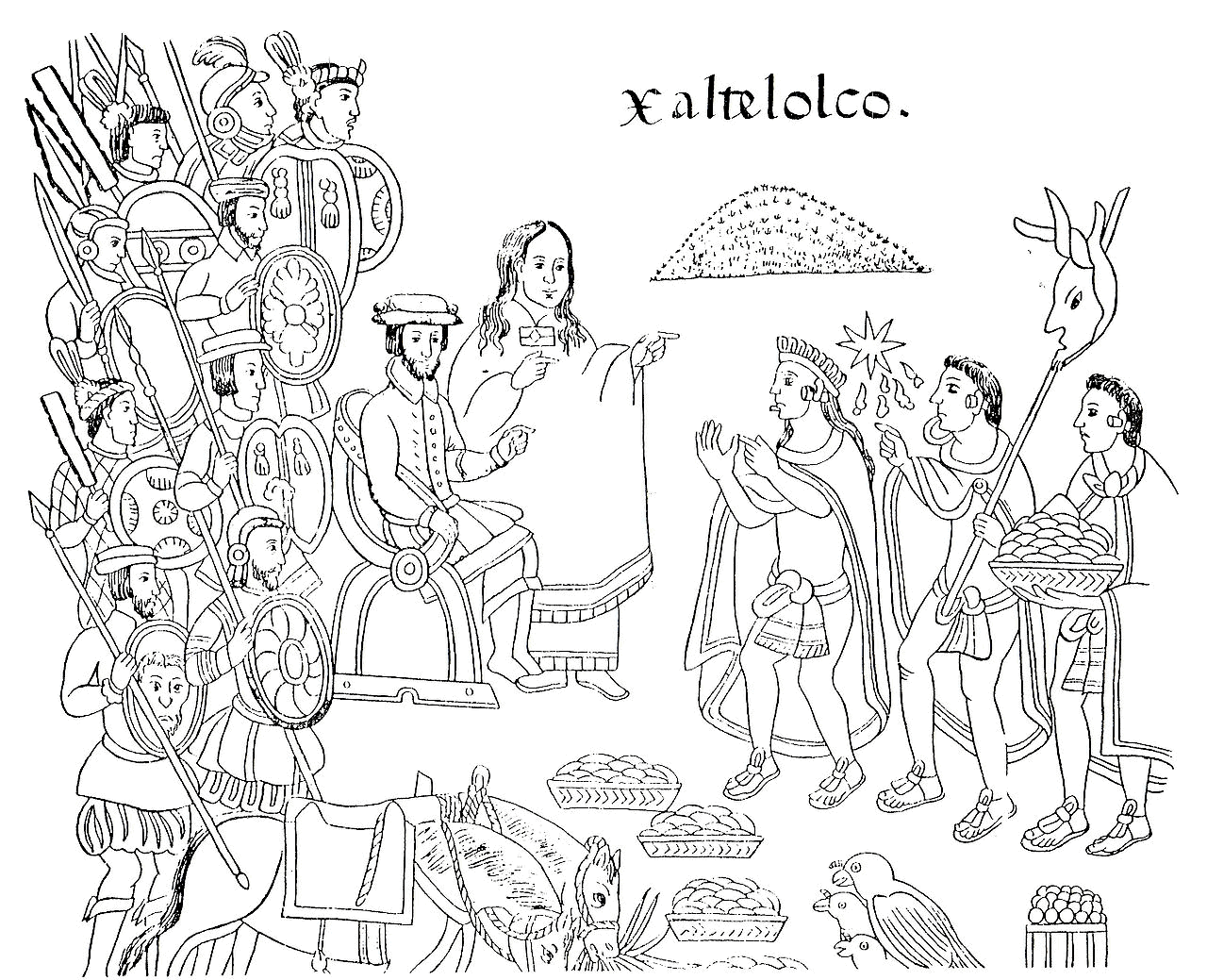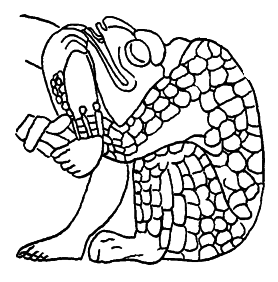新大陸アメリカの征服
Conquest of Americas

新大陸アメリカの征服
Conquest of Americas

このページの目的は、トドロフ『他者の記号学』(原 題「アメリカの征服」)法政大学出版局. 1982の内容を検証するものである。
「トドロフの本は、[マーシャル・]サーリンズがやろうとしたことをみごとに反復している。つまり歴史を、時間進 行にそって語られる物語としてではなく、意味の構造の移行として説明するのである。さらにはこの ような移行をたんに相互作用の観点から見るのではなく、コミュニケーション技術と道 徳的立場とに 結びつけている。単純化して言えば、書かれたものが欠如していれば話者が登場し、反復される儀礼 的形式による口頭伝承が必要となる」マーカスとフィッシャー『文化批判としての人類学』紀伊国屋書店版、p.200.
| The Conquest of
America: The Question of the Other is a book by Tzvetan Todorov first
published in 1982, detailing Spanish colonials' contact with natives
upon the discovery of the Americas. Todorov analyzes texts and arguments from Spanish figures such as Pedro de Valdivia and Francisco de Vitoria. Todorov argues that the latter "demolishes the contemporary justifications of the wars waged in America, but nonetheless conceives that 'just wars' are possible," to make the Spanish "not only subject to the decision but also its judge, since it is they who select the criteria according to which the judgment will be delivered; they decide, for instance, that human sacrifice is the consequence of tyranny, but massacre is not."[1] In his 1992 book The Apotheosis of Captain Cook (which deals with a similar theme of initial contact between Western and indigenous cultures), Princeton anthropology professor Gananath Obeyesekere describes The Conquest of America as "one of the most provocative books of our time."[2] At the same time, Obeyesekere critiques several of the approaches taken by Todorov, specifically the latter's reliance on Spanish conquistador sources that are themselves responsible for generating stereotypical views of the "Otherness" of the native population—stereotypes that Todorov set out to counter.[3] Todorov's book was translated from French into English by Richard Howard. Notes Todorov, Tzvetan. The Conquest of America: The Question of the Other. Harper & Row. pp. 148–150. Obeyesekere (1992, p.16) Obeyesekere (1992, p.17) References Obeyesekere, Gananath (1992). The Apotheosis of Captain Cook: European Mythmaking in the Pacific (1st Princeton Paperback printing, 1994 ed.). Princeton, NJ: Princeton University Press. ISBN 0-691-05752-4. Restall, Matthew (2004). Seven Myths of the Spanish Conquest (1st Oxford pbk ed.). Oxford and New York: Oxford University Press. ISBN 0-19-517611-1. OCLC 51022823. |
『アメリカ征服:他者についての問い』は、ツヴェタン・トドロフが
1982年に初めて出版した著書であり、アメリカ大陸発見時のスペイン人入植者と先住民との接触について詳細に述べている。 トドロフは、ペドロ・デ・バルディビアやフランシスコ・デ・ビトリアといったスペイン人による文章や主張を分析している。トドロフは、後者は「アメリカ大 陸で繰り広げられた戦争の現代的な正当化を打ち砕くが、それでもなお『正義の戦争』はあり得るという考えを持っている」と論じ、スペイン人は「決定を下す だけでなく、その判断を下す基準を自ら選択する立場にあるため、その判断の裁き手でもある。彼らは、例えば、生贄は専制政治の結果であるが、虐殺はそうで はないと判断する」と主張している。[1] 1992年に出版された著書『キャプテン・クックの神格化』(西洋と先住民文化の最初の接触という同様のテーマを扱っている)で、プリンストン大学人類学 教授のガナナス・オベイエセケレは、『アメリカ征服』を「現代における最も挑発的な本のひとつ」と評している。[2] 同時に、 同時に、オベイエセケレはトドロフのいくつかのアプローチを批判しており、特に、スペインの征服者たちの資料に依存していることを指摘している。それらの 資料自体が、先住民の「他者性」に対するステレオタイプな見方を生み出す原因となっている。トドロフは、それらのステレオタイプに対抗しようとしたのだ。 トドロフの著書は、リチャード・ハワードによってフランス語から英語に翻訳された。 注釈 トドロフ、ツヴェタン。『アメリカ征服:他者についての問い』。Harper & Row。148-150ページ。 オベイエセケレ(1992年、16ページ) オベイエセケレ(1992年、17ページ) 参考文献 Obeyesekere, Gananath (1992). The Apotheosis of Captain Cook: European Mythmaking in the Pacific (1st Princeton Paperback printing, 1994 ed.). Princeton, NJ: Princeton University Press. ISBN 0-691-05752-4. レストール、マシュー(2004年)。『スペインによる征服の7つの神話』(第1版、オックスフォード大学出版局、ペーパーバック)。オックスフォードお よびニューヨーク:オックスフォード大学出版局。ISBN 0-19-517611-1。OCLC 51022823。 |
| https://en.wikipedia.org/wiki/The_Conquest_of_America:_The_Question_of_the_Other |
|
| Tzvetan Todorov (/ˈtɒdərɔːv,
-rɒv/; French: [tsvetan tɔdɔʁɔv, dzve-]; Bulgarian: Цветан Тодоров; 1
March 1939 – 7 February 2017) was a Bulgarian-French historian,
philosopher, structuralist literary critic, sociologist and essayist.
He was the author of many books and essays, which have had a
significant influence in anthropology, sociology, semiotics, literary
theory, intellectual history and culture theory. |
ツヴェタン・トドロフ(/ˈtɒdərɔːv, -rɒv/;
フランス語: [tsvetan tɔdɔʁɔv, dzve-]; ブルガリア語: Цветан Тодоров; 1939年3月1日 -
2017年2月7日)は、ブルガリア系フランス人の歴史家、哲学者、構造主義的文学評論家、社会学者、エッセイストである。彼は多くの書籍や論文の著者で
あり、それらは人類学、社会学、記号論、文学理論、知的歴史、文化理論に多大な影響を与えた。 |
| Early life Tzvetan Todorov was born on 1 March 1939 in Sofia, Bulgaria.[1][2] He earned an M.A. in philology at the University of Sofia in 1963. He enrolled at the University of Paris to do his doctorat de troisième cycle (equivalent to the Ph.D.) in 1966 and his doctorat ès lettres in 1970. |
生い立ち ツヴェタン・トドロフは1939年3月1日、ブルガリアのソフィアで生まれた。[1][2] 1963年にソフィア大学で言語学の修士号を取得。1966年に博士課程準備コース(博士号に相当)を、1970年に博士号(文学)を取得するためにパリ 大学に入学した。 |
| Career Todorov was appointed to his post as a director of research at the French Centre National de la Recherche Scientifique in 1968. In 1970, he helped to found the journal Poétique,[2] of which he remained one of the managing editors until 1979. With structuralist literary critic Gérard Genette, he edited the Collection Poétique, the series of books on literary theory published by Éditions de Seuil, until 1987. He was a visiting professor at several universities in the US, including Harvard, Yale, Columbia and the University of California, Berkeley. Todorov published a total of 39 books, including The Poetics of Prose (1971), Introduction to Poetics (1981), The Conquest of America: The Question of the Other (1982), Mikhail Bakhtin: The Dialogical Principle (1984), Facing the Extreme: Moral Life in the Concentration Camps (1991), On Human Diversity (1993), A French Tragedy: Scenes of Civil War, Summer 1944 (1994), Voices from the Gulag: Life and Death in Communist Bulgaria (1999), Hope and Memory (2000), Imperfect Garden: The Legacy of Humanism (2002), In Defence of the Enlightenment (2009), Memory as a Remedy for Evil (2010), The Totalitarian Experience (2011), The Inner Enemies of Democracy (2014) and Insoumis (2015). Todorov's historical interests focused on such crucial issues as the conquest of The Americas and the German Nazi concentration camps. Todorov's greatest contribution to literary theory was his definition, in Introduction à la littérature fantastique (1970), of the Fantastic, the fantastic uncanny, and the fantastic marvelous. Todorov defines the fantastic as being any event that happens in our world that seems to be supernatural. Upon the occurrence of the event, we must decide if the event was an illusion or whether it is real and has actually taken place. Todorov uses Alvaro from Jacques Cazotte's Le Diable amoureux as an example of a fantastic event. Alvaro must decide whether the woman he is in love with is truly a woman or if she is the devil. Upon choosing whether the event was real or imaginary, Todorov says that we enter into the genres of uncanny and marvelous. In the fantastic uncanny, the event that occurs is actually an illusion of some sort. The "laws of reality" remain intact and also provide a rational explanation for the fantastic event. Todorov gives examples of dreams, drugs, illusions of the senses, madness, etc. as things that could explain a fantastic/supernatural event. In the fantastic marvelous, the supernatural event that occurs has actually taken place and therefore the "laws of reality" have to be changed to explain the event. Only if the implied reader cannot opt for one or the other possibility is the text purely fantastic. Aside from his work in literary theory, Todorov also published studies of philosophy. He wrote Frail Happiness about the writings of Jean-Jacques Rousseau. He focuses on Rousseau's ideas of attaining human happiness and how we can live in 'modern' times. In one of his major works, Facing the Extreme, Todorov asks whether it is true the Nazi concentration camps and the Soviet Gulags revealed that in extreme situations "all traces of moral life evaporate as men become beasts locked in a merciless struggle for survival" (31–46). That opinion is commonplace of popularized accounts of the camps, and also appears in accounts of survivors themselves. Primo Levi, quoted in Todorov, writes that camp life is a "continuous war of everyone against everyone." To survive, all dignity and conscience had to be sacrificed and everyone is alone. Reports from gulag survivors are similar. However, in his reading of actual survivor testimonies, Todorov says the picture is not that bleak, that there are many examples of inmates helping each other and showing compassion in human relationships despite the inhumane conditions and terror. Survivors point out that survival always depended on the help of others. He concludes that life in the camps and gulag did not follow the law of the jungle and that the counter-examples are numerous, even in Levi's work. Todorov's honors included the CNRS Bronze Medal, the Charles Lévêque Prize of the Académie des sciences morales et politiques and the first Maugean Prize of the Académie française and the Prince of Asturias Award for Social Sciences; he was also an Officer of the Ordre des Arts et des Lettres. He was an elected member of both the American Philosophical Society[3] and the American Academy of Arts and Sciences.[4] He also received the Prince of Asturias Award for Social Sciences. In 2015, he was awarded the [Wayne C. Booth] Award for lifetime achievement in narrative studies by the International Society for the Study of Narrative. |
キャリア トドロフは1968年にフランス国立科学研究センターの研究ディレクターに任命された。1970年には、雑誌『詩学』の創刊に携わり、1979年まで編集 者の一人として活躍した。構造主義の文学評論家ジェラール・ジュネットとともに、1987年まで、セユイユ社から出版された文学理論に関する書籍シリーズ 「コレクション・ポエティック」の編集を担当した。 また、ハーバード大学、イェール大学、コロンビア大学、カリフォルニア大学バークレー校など、米国の複数の大学で客員教授を務めた。 トドロフは、『散文の詩学』(1971年)、『詩学入門』(1981年)、『アメリカ征服:他者についての考察』(1982年)、『ミハイル・バフチン: 対話の原理』(1984年)、『極限に直面する:強制収容所における道徳的生活』(1991年)、『人間の多様性について』(1993年)、『フランスの 悲劇: 内戦の情景、1944年夏』(1994年)、『収容所からの声:共産主義ブルガリアにおける生と死』(1999年)、『希望と記憶』(2000年)、『不 完全な庭: ヒューマニズムの遺産(2002年)、啓蒙思想の擁護(2009年)、悪に対する記憶の処方箋(2010年)、全体主義の経験(2011年)、民主主義の 内的な敵(2014年)、そして「無視」(2015年)などである。トドロフの歴史的関心は、アメリカ大陸の征服やドイツのナチス強制収容所といった重大 な問題に焦点を当てていた。 トドロフが文学理論に最も貢献した点は、1970年に出版された『幻想文学入門』で「幻想」、「幻想的な不気味さ」、「幻想的な素晴らしさ」を定義したこ とである。トドロフは、幻想とは超自然的であるように思える出来事が現実世界で起こることであると定義している。その出来事が起こったとき、私たちはその 出来事が幻想なのか、それとも現実であり実際に起こったことなのかを判断しなければならない。トドロフは、ジャック・カゾットの『恋する悪魔』のアルヴァ ロを幻想的な出来事の例として挙げている。アルヴァロは、自分が恋する女性が本当に女性なのか、それとも悪魔なのかを判断しなければならない。 その出来事が現実か想像かを選択した時点で、トドロフは、私たちは超自然的で驚異的なジャンルに入ると言う。超自然的で不思議な出来事では、実際に起こる 出来事は、ある種の幻想である。「現実の法則」はそのまま残り、超自然的で不思議な出来事に対して合理的な説明も提供する。トドロフは、夢、薬物、感覚の 幻想、狂気などを、超自然的で不思議な出来事を説明するものとして例示している。幻想的で驚くべき出来事では、実際に起こった超自然的出来事であるため、 「現実の法則」を変更してその出来事を説明する必要がある。暗示された読者がどちらかの可能性を選ぶことができない場合のみ、そのテキストは純粋に幻想的 なものとなる。 文学理論に関する研究のほか、トドロフは哲学に関する研究も発表している。ジャン=ジャック・ルソーの著作に関する『Frail Happiness』を著した。ルソーの人間的幸せの達成に関する考え方と、現代において私たちがどのように生きるべきかという点に焦点を当てている。 彼の主要な著作のひとつ『極限状況における人間性』の中で、トドロフは、ナチスの強制収容所やソビエト連邦のグーラグ(強制収容所)が明らかにしたのは、 極限状況においては「人間が生存をかけた容赦ない闘争に巻き込まれた獣と化し、道徳的な生活の痕跡はすべて蒸発する」という事実であるのかどうかを問うて いる(31-46ページ)。この意見は、収容所に関する一般向け解説ではよく見られるものであり、生存者自身の証言にも見られる。トドロフが引用している プリモ・レヴィは、収容所での生活は「全員が全員に対して絶え間なく戦う戦争」であると書いている。生き残るためには、尊厳や良心をすべて犠牲にしなけれ ばならず、誰もが孤独である。収容所を生き延びた人々の証言も同様である。しかし、実際の生存者の証言を読んだトドロフは、その状況はそれほど暗いもので はなく、非人間的な環境や恐怖にもかかわらず、収容者たちが互いに助け合い、人間関係において思いやりを示した例は数多くあると述べている。生存者は、常 に他者の助けによって生き延びることができたと指摘している。彼は、収容所や強制収容所の生活は弱肉強食の法則に従うものではなく、レヴィの作品にも、そ の反例となるものが数多く存在すると結論づけている。 トドロフは、フランス国立科学研究センター(CNRS)のブロンズメダル、フランス学士院のシャルル・レベック賞、フランス学士院のモージャン賞、アス トゥリアス皇太子賞(社会科学部門)などを受賞している。また、フランス芸術文化勲章のオフィシエでもあった。アメリカ哲学協会[3]およびアメリカ芸術 科学アカデミー[4]の選出会員でもあった。また、アストゥリアス皇太子賞(社会科学部門)も受賞している。2015年には、国際物語学会から、物語研究 における生涯功績に対して[ウェイン・C・ブース]賞を授与された。 |
| Personal life and death Tzvetan Todorov was born in the family of Todor Borov, a Bulgarian linguist and intellectualist from the early 20th century. His brother is the Bulgarian mathematician and theoretical physicist Ivan Todorov. Todorov was married twice. His first wife was the scholar Martine van Woerkens, with whom he had a son, Boris.[1] His second was Canadian novelist and essayist Nancy Huston,[1] with whom he had two children, daughter Léa and son Sacha; he and Huston divorced in 2014.[2] He died on 7 February 2017, at the age of 77.[1] |
私生活と死 ツヴェタン・トドロフは、20世紀初頭のブルガリア人言語学者で知識人であるトドル・ボロフの家庭に生まれた。彼の兄弟はブルガリア人数学者で理論物理学 者のイワン・トドロフである。 トドロフは2度結婚している。最初の妻は学者のマルティーヌ・ファン・ウォークンスで、彼女との間に息子のボリスがいる。[1] 2度目の妻はカナダの小説家でエッセイストのナンシー・ハストンで、彼女との間に娘のレアと息子のサーシャの2人の子供がいる。2014年にハストンと離 婚した。[2] 2017年2月7日、77歳で死去した。[1] |
| Bibliography Books Grammaire du Décaméron (1967) Introduction à la littérature fantastique (1970), translated by Richard Howard as The Fantastic: A Structural Approach to a Literary Genre in 1973 The Poetics of Prose (1971), translated in 1977 Introduction to Poetics (1981) Theories of the Symbol (1982), translated by Catherine Porter Symbolism and Interpretation (1982), translated by Catherine Porter Conquest of America: The Question of the Other (1984), translated from the French by Richard Howard Mikhail Bakhtin: the dialogical principle (1984), translated by Wlad Godzich Literature and its Theorists: A Personal View of Twentieth-Century Criticism (1987), translated by Catherine Porter Genres in Discourse (1990), translated by Catherine Porter On human diversity: nationalism, racism, and exoticism in French thought (1993), translated by Catherine Porter French tragedy: scenes of civil war, summer 1944 (1996), translated by Mary Byrd Kelly; translation edited and annotated by Richard J. Golsan Voices from the Gulag: Life and Death in Communist Bulgaria (1999), Tzvetan Todorov (ed.); translated by Robert Zaretsky A Passion for Democracy: Benjamin Constant (1999), translated by Alice Seberry Facing the extreme: moral life in the concentration camps (2000), translated by Arthur Denner and Abigail Pollack Fragility of goodness: why Bulgaria's Jews survived the Holocaust (2001), a collection of texts with commentary by Tzvetan Todorov Life in common: an essay in general anthropology (2001), translated by Katherine Golsan and Lucy Golsan; with a new afterword by the author Frail Happiness: An Essay on Rousseau[5] (2001), translated by John T. Scott and Robert D. Zaretsky Imperfect garden: the legacy of humanism (2002), translated by Carol Cosman Hope and memory: lessons from the twentieth century (2003), translated by David Bellos (French: Mémoire du mal, tentation du bien, 2000) New world disorder: reflections of a European (2005), preface by Stanley Hoffmann; translated by Andrew Brown Torture and the War on Terror (2009), translated by Gila Walker In Defence of the Enlightenment (2009), translated by Gila Walker The fear of barbarians: beyond the clash of civilizations (2010), translated by Andrew Brown Memory as a Remedy for Evil (2010), translated by Gila Walker Muros caídos, muros erigidos (2011), translated by Zoraida de Torres Burgos The Totalitarian Experience, translated by Teresa Lavender Fagan. Kolkata, India: Seagull Books, 2011 The Inner Enemies of Democracy, translated by Andrew Brown. Cambridge, UK and Malden, MA: Polity Press, 2014 Insoumis: essai. Paris: Robert Laffont: Versilio, 2015 Articles "Humanisme, libéralisme et esprit des Lumières, entretien de Karim Emile Bitar avec Tzvetan Todorov ('Humanism, Liberalism and the Spirit of the Enlightenment')" (in French). L'ENA hors les murs. June 2007. "'L'esprit des Lumières a encore beaucoup à faire dans le monde d'aujourd'hui' ('The Spirit of the Enlightenment still has a lot to do in today's world')" (in French). Le Monde. 4 March 2006. "In search for lost crime: Tribunals, apologies, reparations, and the search for justice" (PDF). The New Republic. 26 January 2001. |
参考文献 書籍 『デカメロンの文法』(1967年) 『幻想文学入門』(1970年)は、1973年にリチャード・ハワードによって『幻想文学:文学のジャンルの構造的アプローチ』として翻訳された 『散文の詩学』(1971年)は、1977年に翻訳された 『詩学入門』(1981年) 『象徴の理論』(1982年)は、キャサリン・ポーターによって翻訳された 『象徴主義と解釈』(1982年)キャサリン・ポーター訳 『アメリカ征服:他者への問い』(1984年)リチャード・ハワード訳 『ミハイル・バフチン:対話の原理』(1984年)ウラジミール・ゴジッチ訳 『文学とその理論家たち:20世紀批評の個人的見解』(1987年)キャサリン・ポーター訳 ジャンルの談話(1990年)、キャサリン・ポーター訳 人間の多様性について:フランス思想におけるナショナリズム、人種差別、エキゾティシズム(1993年)、キャサリン・ポーター訳 フランスの悲劇:内戦の場面、1944年夏(1996年)、メアリー・バード・ケリー訳、リチャード・J・ゴルサン編集・注釈 収容所からの声:共産主義ブルガリアにおける生と死(1999年)、ツヴェタン・トドロフ編、ロバート・ザレツキー訳 民主主義への情熱:ベンジャミン・コンスタン(1999年)、アリス・シーベリー訳 極限に直面する:強制収容所における道徳的生活(2000年)、アーサー・デナー、アビゲイル・ポラック訳 善の脆弱性:なぜブルガリアのユダヤ人はホロコーストを生き延びたのか(2001年)、ツヴェタン・トドロフによる解説付き論文集 共通の生活:一般人類学に関するエッセイ(2001年)、キャサリン・ゴルサンとルーシー・ゴルサンによる翻訳、著者による新しく追加されたあとがき付き 儚い幸福:ルソーに関するエッセイ[5](2001年)、ジョン・T・スコットとロバート・D・ザレツキーによる翻訳 不完全な庭:ヒューマニズムの遺産(2002年)、キャロル・コスマン訳 希望と記憶:20世紀からの教訓(2003年)、デヴィッド・ベロス訳(フランス語:『悪の記憶、善の誘惑』(2000年) 新世界秩序:ヨーロッパ人の考察(2005年)、スタンリー・ホフマンによる序文、アンドリュー・ブラウン訳 『拷問とテロとの戦い』(2009年)ギラ・ウォーカー訳 『啓蒙思想の擁護』(2009年)ギラ・ウォーカー訳 『野蛮人の恐怖:文明の衝突を超えて』(2010年)アンドリュー・ブラウン訳 『悪に対する救済としての記憶』(2010年)ギラ・ウォーカー訳 Muros caídos, muros erigidos (2011), translated by Zoraida de Torres Burgos 『全体主義の経験』、テレサ・ラベンダー・フェイガン訳。コルカタ、インド:シーガルブックス、2011年 『民主主義の内的な敵』、アンドリュー・ブラウン訳。ケンブリッジ、英国およびマールデン、MA:ポリティ・プレス、2014年 『不服従:試論』。パリ:ロベール・ラフォン:ヴェルシリオ、2015年 記事 「ヒューマニズム、リベラリズム、啓蒙の精神」(仏語)。L'ENA hors les murs。2007年6月。 「啓蒙の精神は、今日の世の中でもまだやるべきことがたくさんある」(フランス語)。ル・モンド。2006年3月4日。 「失われた犯罪の追及:法廷、謝罪、賠償、そして正義の追求」(PDF)。ザ・ニュー・リパブリック。2001年1月26日。 |
| https://en.wikipedia.org/wiki/Tzvetan_Todorov |
章立て
1 発見(新大陸の発見;解釈学者コロン;コロンと インディオ)
2 征服(勝利の理由;モクテスマと記号;コルテス と記号)
3 愛(理解、掠奪、殲滅;平等か不平等か;奴隷 制、植民地主義、コミュニケーション)
4 認識(対他関係の類型学;ドラウンまたは文化の 異種交配;サアグンの業績)
エピローグ ラス・カサスの予言
+++++
1 発見
新大陸の発見
解釈学者コロン
コロンとインディオ
2 征服
勝利の理由
モクテスマと記号
コルテスと記号
3 愛
理解、掠奪、殲滅
平等か不平等か
奴隷制
植民地主義
コミュニケーション
4 認識
対他関係の類型学
ドラウンまたは文化の異種交配
サアグンの業績
エピローグ ラス・カサスの予言
リンク
文献
その他の情報
Copyleft, CC, Mitzub'ixi Quq Chi'j, 1996-2099

Did you detect something a little ominous in the way they said, "See you later'?"
彼らが「また後でね」と言った口調に、何か不吉な予感を感じなかった?
¿Notaste algo un poco siniestro en la forma en que dijeron «hasta luego»?